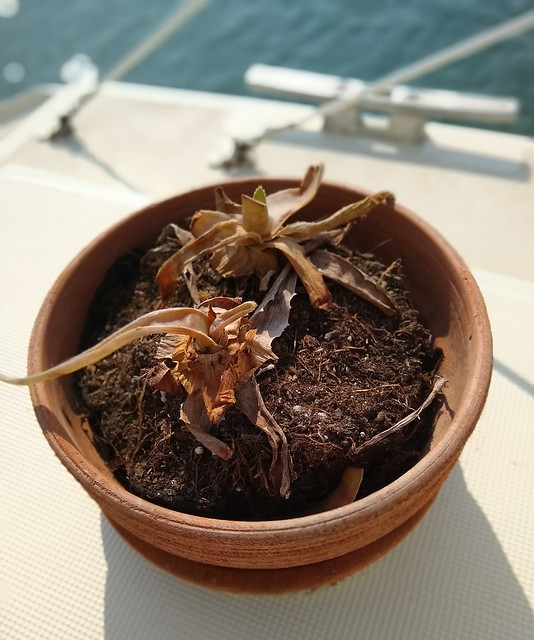I am really bad at keeping plants alive. Even the hearty aloe is not safe on our boat. The one I have kept since the last one got doused with salt water and I sent it, literally, to greener pastures to be revived, isn’t looking so good. With a tiny bit of hope (a last-ditch effort), I watered it this morning on deck, where it sat waiting to go ashore, to the top of the marina dumpster where there is a “free pile.” If the thing is all dead (not just mostly dead), at least someone could re-use the pot. This dead plant got me thinking.
With lots of bad news circulating, the death tally growing, I have been observing people’s responses and seeing very different reactions to the threat of COVID-19. There are people taking it seriously, people scoffing, people suffering anxiety, people arguing for a utilitarian response (where the ends justify the means), and people echoing the words of Revolutionary Patriots—”give me liberty or give me death!” With everyone eyeing each other suspiciously over a mask, fear is in the air.
There is a lot to fear right now: the pandemic itself—of getting sick, the possibility of interminable isolation, the loss of livelihood, the possible loss of liberty, the uncertain future—and, of course, the biggest fear: Death. We face (or run from) this fear every day as a life form on planet earth. If we have been ignoring our own mortality and the questions that surround it, the bad news all around us has probably brought them to the surface. And what we believe about life and death shapes both our responses to the pandemic and our reactions to how others are dealing with it, including elected officials.
We must face our fears, our worst fears, and we must find courage to get up every morning and do what needs to be done while we wait for whatever comes next—keep our spirits up , care for the people we love, and do our daily tasks as best we can. I want to say that I am not afraid, that my sense of God’s love and presence leaves no room for fear, but maybe it’s because death to me is still a concept, a number on a graph, or a news story. I don’t work at a hospital; I am not surrounded by the sight, sounds, and smells of death. But the first-hand accounts are harrowing, and anyone who says otherwise has their head—or heart—buried in the sand.
But I also want to say something about fear’s opposite. And it’s not fearlessness, but faith. My faith is not an ignorant, callous, blind thing that says, “let the chips fall where they may.” It is a fragile thing—fed by hope and a history of God’s goodness to me personally—and it leads to compassion: I see fear and suffering in my fellow creatures and want so much to alleviate it. I believe that how I treat people matters more than dogma and theology. I believe in a God that allows evil (without good and evil, there can be no free-will choice and thus, no possibility of love), but that there is a plan in place to remedy it. I believe that God did send his spirit here in the form of a human being, who had the power to show us what love is, and that he was given the power over death itself, so that we can have communion with our Creator, both now and in a time to come. When death comes, I don’t have to face it alone (in a spiritual sense), and since it isn’t the end, I don’t have to fear it.
Because I am freed-up from the tyranny of fear (not that I never feel it, only that I won’t allow it to camp out in my soul), I can use my mental and emotional energy to love better. I can reach out to friends who are struggling. I can be creating instead of consuming. I can pray for healthcare workers, elderly in nursing homes, the sick and dying, my enemies, my hurting neighbors. I can give when called upon to meet needs. I can feel joy in the middle of hardship. I can focus on something other than cripplingly-dark thoughts. And I hope that you can, too.
Lastly, and because my poor little aloe got me thinking, I believe that loss and pain can serve a purpose, that my life (and yours) in all its glory and its mess, its triumphs and mistakes, has meaning, and that God can recycle all the bad and make something good of it. Maybe that little greenish spike will come back to life and my plant will get a second chance. But maybe it will die and “return to the dust from which it came,” becoming fertilizer for new life in the future. Without death—death of the selfish nature, death of a Messiah, death of organic matter—there can be no new life. It’s a hard teaching, but one that can also bring comfort.

